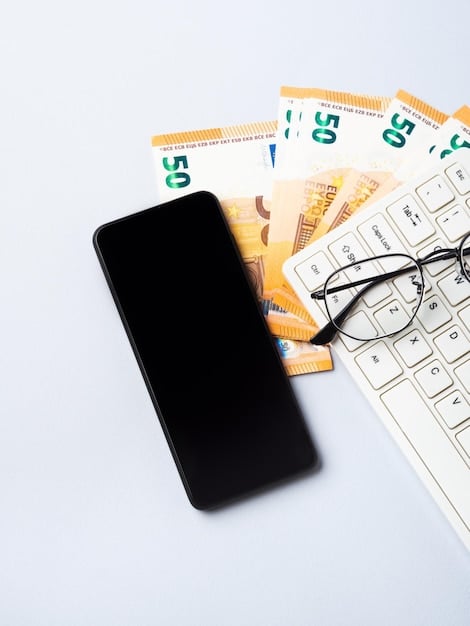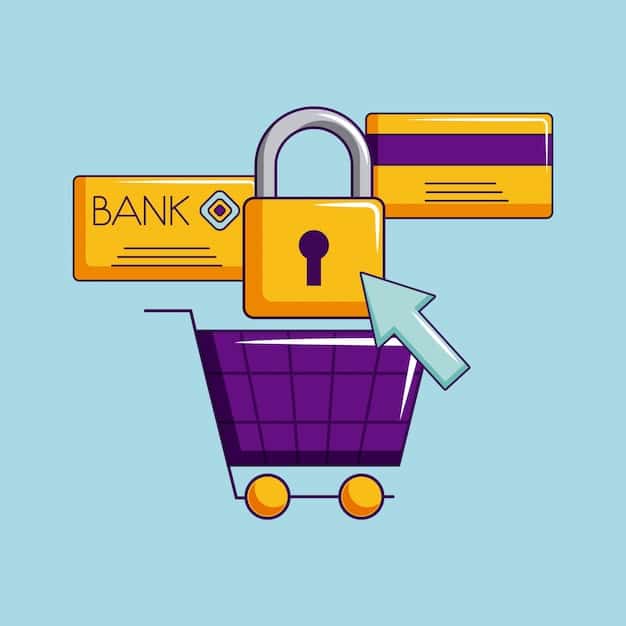US K-Pop Concert Tickets: Resale Market Guide & Scam Avoidance

Navigating the US K-Pop concert ticket resale market requires sharp awareness of legitimate platforms and common scam tactics to secure authentic tickets and avoid disappointment. Understanding official resale channels, pricing nuances, and red flags is crucial for any fan seeking to attend live performances.
Diving into the electrifying world of K-Pop concerts in the US is an experience unlike any other, but securing those coveted tickets can often feel like a high-stakes scavenger hunt. For many fans, the primary sale window is a blink-and-you-miss-it event, quickly selling out and pushing enthusiasts towards the secondary market. This Insider’s Guide: Navigating US K-Pop Concert Ticket Resale Markets (and Avoiding Scams) aims to equip you with the knowledge to safely and successfully purchase K-Pop concert tickets from resale platforms, ensuring your journey to see your favorite idols live is free from fraud and frustration.
Understanding the K-Pop Ticket Landscape in the US
The demand for K-Pop concert tickets in the US has skyrocketed, making initial sales a chaotic battleground. Artists like BTS, BLACKPINK, TWICE, and Stray Kids routinely sell out arenas in minutes, leaving a substantial portion of the fanbase to explore resale options. This intense demand fuels a vibrant, yet often treacherous, secondary market.
Official primary ticket vendors like Ticketmaster, AXS, and Live Nation are the first point of contact for K-Pop concert tickets. However, due to overwhelming demand, many fans find themselves shut out almost instantly. This scarcity then drives up prices on resale platforms, with tickets often trading hands for significantly more than their face value. It’s a testament to the passionate dedication of K-Pop fandom, but it also creates fertile ground for misinformation and scams.
The Anatomy of K-Pop Ticket Sales
Understanding how K-Pop tickets are initially sold can help you better navigate the resale market. Most sales involve a pre-sale period for fan club members or credit card holders, followed by a general public on-sale. Both typically occur online, with tickets often allocated through a digital queue system that can be notoriously difficult to beat.
- Fan Club Pre-sales: Exclusive access for official fan club members, often requiring a membership purchase and a registration process to receive a unique code.
- General On-sale: Open to the public, these tickets are usually the last to be released and often sell out within minutes, sometimes even seconds.
- Verified Fan Programs: Some artists use Ticketmaster’s Verified Fan system to help filter out bots by requiring fans to register in advance. This doesn’t guarantee a ticket but increases your chances.
The speed at which tickets disappear from primary markets means that many fans turn to resale platforms as their only hope. This makes diligence and careful research absolutely essential before committing to any purchase.
Legitimate Resale Platforms: Your Best Bet
When primary tickets are gone, legitimate resale platforms become your safest bet. These platforms offer a degree of buyer protection and verification that direct peer-to-peer sales often lack. While prices might be inflated, the security they offer is often worth the extra cost.
Each platform has its own policies regarding seller verification, buyer guarantees, and fees. Familiarize yourself with these details before making a purchase. Knowing what protections are in place can provide significant peace of mind.
Key Resale Sites and Their Features
Several major players dominate the US ticket resale market, each with its own benefits and drawbacks:
- Ticketmaster Resale (Fan-to-Fan Resale): Often the safest option, as tickets sold here were originally purchased through Ticketmaster and can be directly reissued to your account. This significantly reduces the risk of fake tickets.
- StubHub: A well-established secondary market giant with a “FanProtect Guarantee” that promises valid tickets or your money back. They handle a large volume of transactions and generally have a good reputation.
- SeatGeek: Aggregates listings from various resale sites, offering a comprehensive view of available tickets. Their “Deal Score” system helps identify good value. They also offer buyer guarantees.
- Vivid Seats: Similar to StubHub, Vivid Seats offers a 100% buyer guarantee. They are known for competitive pricing and a user-friendly interface.
While these platforms offer robust protections, it’s still crucial to be mindful of pricing and compare options across different sites. Fees can vary, so always check the final price before checking out.
Navigating Pricing and Hidden Fees
The resale market is notoriously volatile when it comes to pricing. Tickets for highly anticipated K-Pop concerts can fetch astronomical sums, sometimes several times their original face value. Understanding how pricing works and identifying potential hidden fees is critical to avoid overpaying.

Resale prices are dictated by supply and demand. If a concert is sold out and demand remains high, prices will naturally increase. This isn’t necessarily a scam, but rather the nature of the secondary market. However, be wary of prices that seem excessively high compared to similar listings for the same event, as this could indicate a speculative seller or a less reliable source.
Understanding Service Fees and Taxes
One of the most frustrating aspects of ticket resale is the various fees added on top of the listed ticket price. These can often inflate the final cost significantly. Always factor these into your budget:
- Service Fees: Charged by the resale platform for facilitating the transaction, verifying tickets, and providing customer support. These can range from 10% to 30% or more of the ticket price.
- Delivery Fees: For electronic tickets, this is usually minimal or non-existent. For physical tickets, there might be a shipping charge.
- Taxes: Sales tax may be applied depending on your location and the platform’s policies.
Most reputable platforms will show you the full price, including all fees, before you complete your purchase. Always make sure you see this “all-in” price to avoid sticker shock at the last minute. If a seller is pushing for a price without disclosing fees upfront, consider it a red flag.
Spotting and Avoiding Scams on the Resale Market
Unfortunately, where there’s high demand and passionate fans, scammers often lurk. K-Pop concert tickets are a prime target for fraudulent activities, from counterfeit tickets to entirely fake listings. Being vigilant and knowing the warning signs can save you from heartbreak and financial loss.
Scammers often exploit the urgency and emotional investment fans have in seeing their favorite groups. They might pressure you into quick decisions or offer deals that seem too good to be true. Remember, if something feels off, it probably is.
Common Scam Tactics to Watch Out For
Familiarize yourself with these prevalent scam methods to protect yourself:
- Fake Tickets/PDFs: Scammers may create convincing but fake PDF tickets or screenshots. Since many tickets are digital, it can be hard to verify authenticity without proper channels.
- Ghosting After Payment: The seller disappears after you send money, leaving you with no ticket and no recourse.
- Overpriced or Non-existent Tickets: Listings for tickets that don’t exist or are priced ridiculously high, often used to lure desperate buyers into unsafe transactions.
- Payment Method Pressure: Insisting on unconventional payment methods like gift cards, wire transfers, or direct cash apps (e.g., Zelle, Cash App, Venmo) that offer no buyer protection.
- Selling the Same Ticket Multiple Times: A scammer sells the same digital ticket to multiple buyers, only one of whom will be able to enter the venue.
Always prioritize transactions through secure platforms with buyer guarantees. Avoid making payments outside these systems, even if the seller promises a discount. The risk far outweighs any potential savings.
Red Flags in Private Sales
When attempting to buy tickets from individuals (e.g., through social media, Reddit, or private forums), be extra cautious. While some private sellers are legitimate, this is where the bulk of scams occur. Look for:
- Brand New Accounts with No History: A profile created recently with little to no activity, friend list, or previous posts is a major warning sign.
- Unwillingness to Provide Proof: If a seller refuses to show proof of purchase, ticket screenshots with sensitive info redacted, or a video of them logging into their ticket account, walk away.
- Pressure to Buy Quickly: Scammers often create a false sense of urgency to prevent you from doing proper due diligence.
- Inconsistencies in Story: If their reason for selling or details about the tickets change, it’s a sign of dishonesty.
It’s always recommended to meet in person at a public place if buying physical tickets, and to verify the tickets through the official vendor’s app if possible. Never pay for tickets before you have confirmed their authenticity.
Secure Transaction Practices and Buyer Protection
Protecting your money and ensuring you receive a legitimate ticket should be your top priority. Adopting secure transaction practices and understanding buyer protection mechanisms offered by different platforms is key to a stress-free purchase.
Even on reputable resale sites, it’s wise to take precautions. Read reviews of sellers if available and pay attention to any warnings or advisories provided by the platform. Your due diligence is your best defense.
Payment Methods and Buyer Guarantees
The payment method you choose can significantly impact your ability to recover funds if you encounter a scam:
- Credit Card: Offers the strongest buyer protection. Most credit card companies allow you to dispute fraudulent charges.
- PayPal (Goods & Services): This option includes buyer protection, but avoid using “Friends & Family” as it offers no recourse for fraudulent transactions.
- Legitimate Resale Platforms: Their built-in buyer guarantees are your primary layer of protection. Always ensure you understand the terms of these guarantees.
Under no circumstances should you use direct wire transfers, gift cards, or cash apps for private sales, as these offer little to no protection if the transaction goes awry. Once the money is sent, it’s often impossible to get back.

Verifying Tickets Before Purchase
Before finalizing any purchase, especially in private sales, try to verify the tickets. This can be challenging with digital tickets, but some strategies exist:
- Ticketmaster/AXS Transfer: If buying from an individual, ask them to transfer the tickets directly to your Ticketmaster or AXS account. This is one of the most secure methods as it essentially reissues the ticket in your name.
- Video Proof: Ask the seller for a video of them logging into their official ticket account and navigating to the specific tickets. Crucially, ask them to scroll or move the screen to show it’s not a static screenshot, and ensure the date and time match your current inquiry.
- Redact Sensitive Info: When requesting screenshots, ensure the seller redacts sensitive information (barcodes, full names, addresses) to prevent further fraud.
Trust your instincts. If a seller is hesitant to provide reasonable proof of ownership or insists on an unsecured payment, it’s safer to walk away and look for another option.
Ethical Considerations and Fan Culture
The discussion around ticket resale often sparks passionate debate within the K-Pop fan community. While some view resale as a necessary evil to meet demand, others criticize scalpers for exploiting fellow fans and contributing to inflated prices. Understanding these ethical dimensions is part of navigating the market responsibly.
Many fans advocate for policies that prioritize genuine fans, such as personalized tickets or stricter anti-bot measures. Supporting responsible resale practices means choosing platforms that actively combat fraud and offer fair terms to both buyers and sellers.
The Fan Perspective on Resale
For many K-Pop fans, attending a concert is more than just entertainment; it’s a significant emotional and financial investment, a chance to connect with an artist they adore. When tickets are resold at exorbitant prices, it can feel like a betrayal of the fan community.
However, life happens. Sometimes legitimate fans genuinely can’t attend a concert due to unforeseen circumstances and need to resell their tickets. The challenge lies in distinguishing between these genuine situations and those driven purely by profit. Supporting ethical resale means recognizing that sometimes fans need to sell for legitimate reasons, and not all resellers are “scalpers.”
Supporting Fair Practices
As a buyer, you can indirectly support fairer practices by:
- Prioritizing Official Resale Channels: Platforms like Ticketmaster’s Fan-to-Fan Resale often cap prices or ensure tickets are resold at face value or slightly above, aligning with more ethical standards.
- Reporting Price Gouging (where applicable): In some regions or for certain events, there might be regulations against excessive price gouging.
- Advocating for Better Ticketing Systems: Engage with ticketing companies and artists to express concerns about current systems and push for more fan-friendly solutions.
Ultimately, making informed decisions on the resale market is not just about personal protection but also about contributing to a healthier and more sustainable fan culture for K-Pop in the US.
Last-Minute Ticket Hunting and Day-Of Strategies
If you’ve been unsuccessful in securing tickets through primary sales or early resale attempts, don’t despair. There are often opportunities to find tickets closer to the concert date, sometimes even on the day of the show. This strategy requires patience, flexibility, and a bit of nerve, but it can pay off.
As the concert date approaches, sellers who are desperate to offload their tickets might drop prices significantly. This is particularly true if they have excess inventory or realize they can’t attend. However, this period also sees a last-minute surge in scam attempts, so vigilance remains paramount.
Day-Of Ticket Exchange
For many K-Pop fans, the day of the concert involves hitting refresh on resale apps and looking for last-minute deals. Here are some tactics:
- Price Drops: Sellers often lower prices in the hours leading up to the show if their tickets haven’t sold. Continue checking reputable sites like StubHub or SeatGeek.
- Venue Box Office: Sometimes, the venue releases held-back tickets (production holds, VIP returns) on the day of the show. It’s rare for K-Pop, but worth checking.
- Social Media Swaps (with Extreme Caution): Some fans might post about last-minute changes and offer tickets at face value or for a trade. Be extremely careful here; this is a high-risk area for scams. Always use secure payment methods and verify, verify, verify.
Attending a K-Pop concert is an incredible experience, and while the ticket hunting process can be daunting, armed with knowledge, you can navigate the resale market safely and score those precious seats.
| Key Point | Brief Description |
|---|---|
| 🔍 Use Reputable Platforms | Prioritize sites like Ticketmaster Resale, StubHub, and SeatGeek for buyer protection. |
| 💸 Understand Pricing & Fees | Be aware of fluctuating resale prices and hidden service charges. Always check the “all-in” price. |
| 🚫 Avoid Scams & Red Flags | Beware of private sellers, suspicious payment methods, and pressure tactics. |
| 💳 Use Secure Payment Methods | Credit cards and PayPal (Goods & Services) offer the best buyer protection against fraud. |
Frequently Asked Questions About K-Pop Ticket Resale
Not always, but often. For high-demand K-Pop concerts, prices on the resale market typically exceed face value due to scarcity. However, closer to the event date, some sellers may drop prices if they still haven’t sold their tickets, occasionally offering them near or even below face value.
The safest way is through official resale programs directly linked to the primary vendor, such as Ticketmaster’s Fan-to-Fan Resale. If those aren’t available, reputable third-party platforms like StubHub or SeatGeek provide buyer guarantees. For private sales, insist on official ticket transfers and use payment methods with strong buyer protection like a credit card or PayPal Goods & Services.
While reputable sites offer strong buyer guarantees, there’s always a slight risk of issues. However, their guarantees mean that if a ticket is invalid or fake, you will typically receive a refund or comparable replacement. The risk is significantly lower compared to direct peer-to-peer transactions.
Look for established online presence, willingness to provide clear proof of purchase (with sensitive details redacted), and agree to official ticket transfers. Be wary if they have a new account, pressure you to buy quickly, refuse to video-call, or insist on unsecured payment methods like gift cards or wire transfers. Trust your gut feeling.
If you bought through a reputable platform, contact their customer service immediately to enact your buyer guarantee. If you paid with a credit card, contact your bank to dispute the charge. For private sales using PayPal Goods & Services, open a dispute. Report the scammer to the platform where you found them, and to local authorities if significant money is involved.
Conclusion
Navigating the US K-Pop concert ticket resale markets can be a complex and sometimes challenging endeavor, but with the right knowledge and precautions, it doesn’t have to be a gamble. By understanding the legitimate platforms, recognizing common scam tactics, and prioritizing secure transaction practices, K-Pop fans can significantly increase their chances of securing genuine tickets and enjoying the once-in-a-lifetime experience of seeing their favorite groups perform live. Stay vigilant, stay informed, and always put your safety and financial security first when hunting for those coveted K-Pop concert tickets.





